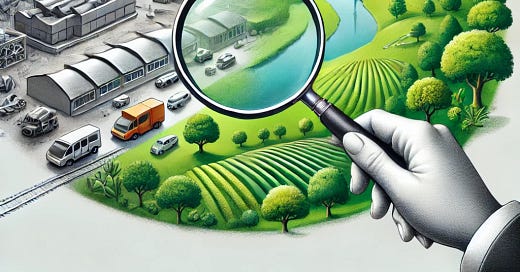As I am preparing an article trying to dig into how the readers of this newsletter perceive sustainability, I reflected on the lessons learned from September.
September has brought important lessons in my work on sustainability and leadership. The shift from compliance-focused sustainability to value creation is a recurring theme, highlighting the shift to move beyond numbers and reporting. AI's impact on responsible leadership and the importance of cross-functional collaboration are also key points of focus.
1. Sustainability: From Reporting to Value Creation
Sustainability has often been approached as a box-ticking exercise. The real challenge lies in transforming sustainability from a reporting exercise into a driver of long-term value. This transition is crucial for businesses that want to stay relevant in a rapidly evolving world. True leadership is not about compliance, but about leveraging sustainability to foster innovation and create purpose-driven value. Leaders must constantly ask, are we just reporting data, or are we using sustainability as a tool for genuine impact? As I discussed previously one issue with sustainability is to come up with an understanding that is global, encompassing of all cultures and driven towards the future.
Key insight: Sustainability reporting should be a catalyst for innovation. It's about embedding purpose into business strategy and using it to drive value for both the company and society. Ungrowth, degrowth are just mental models that talk to 1% of the people on this planet.
2. AI’s Role in Responsible Leadership
AI offers immense potential, from optimizing processes to improving decision-making. However, its power comes with responsibility. Leaders must ensure that AI benefits both the organization and society, without exacerbating inequalities. The ethical use of AI is paramount, and it requires careful consideration of its broader societal impacts. I changed my view on AI this month by writing my first piece of code in decades thanks to ChatGPT. What should have taken me 2 days of re-learning the right libraries, testing took 15 minutes…
Key insight: While AI enhances efficiency, it demands leadership that aligns its deployment with ethical principles, ensuring its benefits are equitably distributed.
3. Cross-Functional Collaboration for Sustainability
Sustainability is not a standalone department; it's an organizational transformation. Effective strategies require collaboration across all functions—operations, finance, HR, and beyond. Shared responsibility ensures that sustainability is woven into the company’s core. It’s about breaking silos and aligning everyone towards a common purpose. All my classes and workshops this month illustrated this point.
Key insight: For sustainability to be impactful, it needs collective ownership across the organization, ensuring that every department sees it as a shared goal.
4. Shaping the Next Generation of Responsible Leaders
Preparing future leaders to navigate sustainability is essential. It's not just about understanding environmental issues but fostering a mindset that integrates sustainability into every decision. Leadership education must go beyond theory, focusing on embedding sustainability into everyday practice.
Key insight: The future of leadership hinges on the ability to integrate sustainability into core decision-making, recognising it as a central element of business success.
5. Sustainability as a Continuous Journey
Sustainability is not a destination but an ongoing process. It requires constant learning and adaptation in a rapidly changing world. Leaders must be comfortable with uncertainty, ready to rethink and innovate continuously. The organizations that thrive will be those that remain flexible and open to new approaches.
Key insight: Embracing sustainability as a journey of continuous improvement is essential for long-term success. Leaders must remain agile, adapting to evolving challenges.
The journey forward to shifting the lens is now clear, finding and training responsible leaders to create value through sustainability by:
Demanding a green premium on existing products or on financing mechanisms
Generating opportunities to save costs through better resource use
Innovating and creating new business models and products helping others in your value chain
The compass guiding them being compassion and purpose. The goals are now well established and clarified. Let’s dig into what professionals define as sustainability today and what the expectations for this newsletter are.





